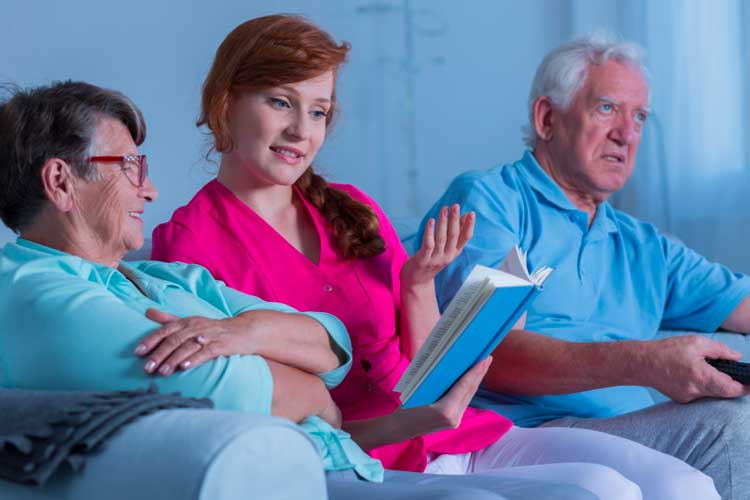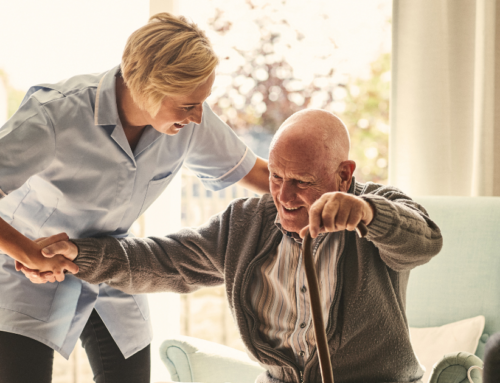A Guide to Remote Caregiving – When my grandparents retired, they made the farthest cross country move possible. Years before they had fallen in love with the Hawaiian islands, so when they were ready for retired life they packed up and moved from Massachusetts to Maui.
For the first decade or so this was nothing but a positive change for them and the rest of their family. My father, aunts and uncles all took the chance to take beautiful Hawaiian vacations as much as possible. The flight from the east coast was long and often expensive, but it was worth it–especially when you factored in the bonuses of visiting mom and dad and always having a free place to stay.
We still love visiting my grandfather in Maui, grandchildren now included. Eventually, however, the difficulties of living so far from an elderly love one became apparent. The primary issue is that in emergency situations it is not always easy for a trusted family member to head out quickly to offer assistance.
The Obstacle of Long Distance Remote Caregiving
My parents, aunts and uncles first experienced this logistical obstacle when my grandmother passed away. On top of the emotional traumas associated with loss, everybody dealt with the inconvenience of distance. Most obviously challenging was the financial aspect of the situation; it was extremely difficult to buy a last minute plane ticket to one of the most popular vacation spots in the world. Of course, everyone made their best efforts to scrape up the money for the trip–this was a family emergency that no one wanted to excuse themselves from. On top of financial limitations, however, the obstacles of this situation extended to the difficulties of communicating throughout a now rather spread out family.
Most of my aunts and uncles never left the east coast, whereas my father had promptly left their hometown in young adulthood and moved around to a handful of varying states, none of which were in close proximity to his roots. Now in his retirement years and widowed, my grandfather could not easily lean on any of his children if he needed assistance. Furthermore, with the obstacles of varying time zones and day to day schedules, it was difficult to keep everyone on the same page about my grandfather’s wellbeing.
Physical Distance Does Not Indicate A Lack of Interest
This is not to say that my relative’s physical distance from one another means they do not care enough for those whom they hold closest to their hearts. Distance is simply a reality for many Americans. Job offers, relationships, and independent desires for freedom and discovery often make it difficult to remain physically close to our loved ones. For many moving around is inevitable, but it does brings its challenges. Not only does this distance lead to us missing time spent with the ones we love, it can cause great stress when circumstances call for familial support. Especially when considering elderly family members, it is understandable to worry about their wellbeing as they face declining physical ability.
If you find yourself in a similar situation as my family, you will want to learn as much as possible about the best ways to coordinate caregiving amongst a spread out family unit.
If you have made the decision to take on the responsibility of remote caregiving, it is important to stay level headed and hopeful about your ability to best support your elderly loved one. While a certain degree of stress in this process is inevitable, there are ways to make everything run far more smoothly than expected. Ultimately, careful and deliberate planning, open communication, and flexibility will help ease everything along. It will be important to develop some clearly established strategies to stay on top of caregiving, even if you find yourself far from your elderly loved one.
Communication is Key
If you and your family are spread out geographically and find yourself needing to care for a loved one, making sure everyone is on the same page will prevent disaster. The best way to keep communication clear and direct is to form a list of everyone involved in caring for your parent or other elderly family member.
Communication is key, especially in situations when coordinating a group of people in a variety of different places.
This will involve far more than just immediate family members–it will take some careful attention to put together a list of everyone you need to stay in contact with about your loved one’s wellbeing.

Family dynamics are always different case by case, so determining who may contribute to caregiving is not always as simple as turning to a person’s next of kin. Instead, you will need to determine which family members–as well as significant non-family members–need to be included in the conversation about your loved one’s caregiving. Here are some examples of people you will need to stay in communication with if you are acting as a remote caregiver:
- Fellow family members; this might include your siblings if you are taking care of a parent, but could obviously extend to others as well.
- Neighbors or friends of your elderly loved one who check up on them.
- Any professional care services they might utilize, such as a home care service, nursing home, or other assisted/independent living communities.
- Doctors that your loved one consults with
Keeping contact information for anyone you may need to update or seek out information on your loved ones wellbeing will help make remote caregiving easier in the long run. In case of emergencies, you will want to be able to call the right people who may live closer to your family member, such as neighbors, friends, or caretakers who see them on a regular basis.
Delegating the Caregiving Responsibilities
If you are coordinating caregiving amongst a group of family members, it will probably simplify the process to delegate responsibilities and take turns with certain tasks. This task requires different levels of coordination depending on your situation.

Perhaps you and your siblings are caring for a parent who lives in relative proximity to all or some of you. Maybe one of you is a 20 minute drive away, someone else an hour or two. Delegating caregiving roles and taking turns caring will function on a far more frequent basis. You may switch off who drives your parent to the doctor’s office, or who checks up on them when needed. It may be a good idea to have whoever lives closest to help with more daily tasks for your parent, such as cooking, cleaning, or other help around the house. In return, you could agree that the farther sibling will take your parent to doctor’s visits or other periodic outings, tasks that require less frequent attention but still help relieve some of your duties.
Other families, such as my own, will deal with a much greater issue of distance. If the closest family member to your elderly loved one is still a flight away, delegating caregiving tasks will focus more heavily on communicating with the care providers and assistive services that are close to your loved one.
Choose a Primary Remote Caregiver
Another important task in remote caregiving is determining who will act as the primary facilitator of remote care. Everything will work much more smoothly if one person assumes the main responsibility of communication; this primary remote caregiver will have the duty of keeping everybody else in the loop.
Often times, those in closest proximity will assume the brunt of the work associated with caregiving.
Even in the case of remote caregiving, this will likely occur. For instance, my dad is still physically the closest child to my grandfather, despite the six hour flight and pacific ocean that separates them. Because of this he often is the first person on call to help out his father, he has assumed the role as the primary remote caregiver. Another important part of this role to remember is that you will likely be the emergency contact for your loved one. In the case of my family, my dad is the first person on the list to call for my grandfather’s hospital and doctor’s visits, and the first to receive any information from his nursing home.
Just because you are the most involved in an elderly adult’s caregiving does not mean that you have to be alone in this. It is likely that you will encounter other family members who want to offer their support in any way they can. This is when delegation can be extremely helpful. Be straightforward with the rest of your family and ask who is willing to help out. Maybe someone can offer financial support, which will help with travel costs or medical expenses for your loved one. Others may be willing to do research on caregiving, communicate with any care services your loved one might need, and help plan out the best approach to your unique situation.
Hold Family Meetings
Even with proper organization, planning, communication, and delegation, long distance caregiving can feel overwhelming at times. Teamwork, however useful, can be stressful. Hopefully you can reduce this stress by coming together for family meetings. This can be a good chance for everyone involved in caregiving for your loved one to come together, regardless of how far you all may be from one another.
Family meetings will help cut down on miscommunications and keep everyone up to date on the situation. Coming together as a family can also be helpful in cultivating a sense of support. As well as solving logistical problems, it will give everyone a chance to voice any concerns or emotional difficulties they may experience with caring for an elderly parent or loved one.
Take Advantage of Modern Communication Technology
Many utilize zoom, skype or groups calls not only for socialization, but for business meetings as well. Likewise, you can set up group video chats or calls to have conversations about remote caregiving. Consider making a group chat or email thread as well to ensure more regular communication. This makes it easier for everyone to stay in the loop while also allowing for those with busy schedules to stay in contact when most convenient for them.
For many, assembling in person for a meeting is not a viable option. Luckily the vast options for communicating via technology can make it possible for siblings and/or other loved ones to still meet on a semi-regular basis.
Despite efforts to organize meetings and stay up to date with caregiving issues, you may still worry about communicating easily with your family. The unfortunate truth is that every family is made up of unique relationships, and not everyone will necessarily get along, especially in times of stress or difficulty. If your family experiences tension or discord, you will need to put in extra effort to keep your interactions compassionate and level headed.
Remember that at the end of the day, everyone on board with caregiving wants the best for your elderly loved one. Avoid emotional arguments that deal with past experiences or family baggage, and try to put everything aside. As difficult as this may seem, forgiving and forgiving will make it easier to make judgement calls and provide the best care and support possible.
Consider a Professional Remote Care Coordinator
If your elderly parent or loved one reaches the point of needing more hands on care, consulting a professional care coordinator may be a good idea, especially if you and the rest of your family struggles with distance. A professional care coordinator will help coordinate all of the health care and daily care needs of your loved one. They can help find the best options for hands on care that you may otherwise have difficulty accessing or hiring at an affordable rate.
A professional care coordinator can be a health worker such as a nurse, a social worker, or even someone from your insurance company who is specialized in caregiving. They will evaluate the needs of your elderly loved one and help connect them to the services they need. This job can help remote caregivers to keep track of what their elderly loved one needs when it is difficult to personally check up on them. This can also be extremely valuable in lowering caregiving costs, as professional care coordinators can work with your loved one’s insurance companies to find the most affordable options for care.
Make Sure Your Loved One has What they Need
Providing care remotely or long distance can be extremely anxiety provoking, especially if you do not get to see your loved one as often as you like. The best way to set your mind at ease is to make sure that your loved one is provided with all of the care and help that they need when you or your siblings/family cannot physically be there for them.

Check in with the person you care for directly to see if there is anything practical you can do for them to ensure their comfort and health. This will not only give you a first hand idea of how they are doing, but strengthen your relationship with them. In general, staying in contact with your loved one will make for a more gratifying caregiving experience.
You will also want to stay in contact with daily caregivers, especially if your loved one is at a point where they have trouble with cognition or rational reasoning. Those around them can help fill you in on how they are doing if you feel you cannot trust your loved one’s own evaluation of their needs.
Evaluate Why You Have Chosen Remote Caregiving
Even with all of these approaches to remote caregiving taken into consideration, surprises along the way will inevitably make it a difficult job at times. It is always extremely important to consider your own wellbeing throughout the process of caregiving. As a long distance remote caregiver, you will want to evaluate why you have chosen to take on this role, as well as make sure anyone else involved in remote care is doing the same. Make sure the level of involvement you and others have chosen to take on in caregiving is not overwhelming. Ultimately, you should be providing this help for your loved one because you want to, not out of a sense of obligation.
No matter how dedicated to supporting your elderly loved one, you may need assistance in the process. Especially as a remote caregiver, it is important to reach out for help when you need it to ensure both you and your loved one’s well being. When you need support, reach out to any family who has expressed a willingness to support you. In addition, never hesitate to consult professional services that can ensure that your loved one will be taken care of on a daily basis. Professional care coordination, living assistance, or home care can be a huge help to elderly adults who need daily assistance. If you want to know more about caregiving options, feel free to contact New Wave Home Care at any time for more information

Remember the Big Picture
Despite its difficulties, I know that remote caregiving has been an extremely rewarding experience for my family. My grandfather is now 88 years of age, and at no time in the future does he plan on moving away from his beloved place of retirement. At times, this can cause great frustration for family members. “Why can’t you move to California?,” my father often asks, “you can see us more often, and your other children will be able to make the trip out to visit far more frequently.” All of this rationalization is valid, but at the same time we have recognized the importance of supporting my grandfather’s wishes.
If you have decided that taking on a relatively active role as a remote caregiver, it is important to remember the benefits of doing so. If remote caregiving leads to a happier environment for you and the rest of your family, there is great value in coordinating caregiving across distance.
So long as his happiness stays intact by staying in the place he feels comfortable, we have no problem flying out to the beautiful Hawaiian islands whenever we can to make a visit. We know that he has the care he needs in Maui, and also has a loving family to support him on the mainland. The extra effort of long-distance communication is extremely worthwhile. If you have weighed your options and also see these benefits, it is clear that long distance remote caregiving can absolutely be worth the effort.







